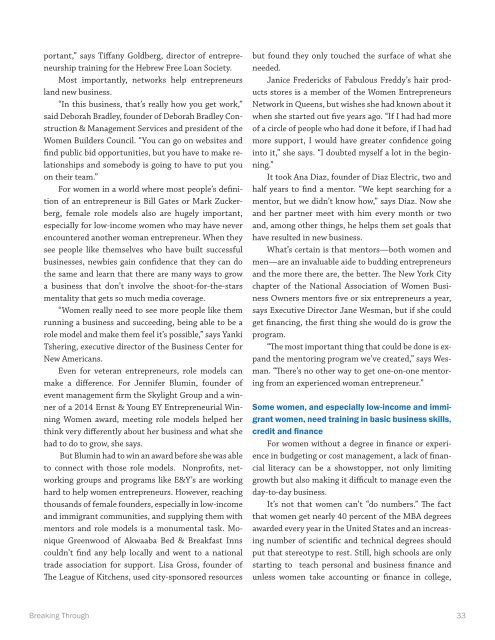BREAKING THROUGH
YWkgl
YWkgl
You also want an ePaper? Increase the reach of your titles
YUMPU automatically turns print PDFs into web optimized ePapers that Google loves.
portant,” says Tiffany Goldberg, director of entrepreneurship<br />
training for the Hebrew Free Loan Society.<br />
Most importantly, networks help entrepreneurs<br />
land new business.<br />
“In this business, that’s really how you get work,”<br />
said Deborah Bradley, founder of Deborah Bradley Construction<br />
& Management Services and president of the<br />
Women Builders Council. “You can go on websites and<br />
find public bid opportunities, but you have to make relationships<br />
and somebody is going to have to put you<br />
on their team.”<br />
For women in a world where most people’s definition<br />
of an entrepreneur is Bill Gates or Mark Zuckerberg,<br />
female role models also are hugely important,<br />
especially for low-income women who may have never<br />
encountered another woman entrepreneur. When they<br />
see people like themselves who have built successful<br />
businesses, newbies gain confidence that they can do<br />
the same and learn that there are many ways to grow<br />
a business that don’t involve the shoot-for-the-stars<br />
mentality that gets so much media coverage.<br />
“Women really need to see more people like them<br />
running a business and succeeding, being able to be a<br />
role model and make them feel it’s possible,” says Yanki<br />
Tshering, executive director of the Business Center for<br />
New Americans.<br />
Even for veteran entrepreneurs, role models can<br />
make a difference. For Jennifer Blumin, founder of<br />
event management firm the Skylight Group and a winner<br />
of a 2014 Ernst & Young EY Entrepreneurial Winning<br />
Women award, meeting role models helped her<br />
think very differently about her business and what she<br />
had to do to grow, she says.<br />
But Blumin had to win an award before she was able<br />
to connect with those role models. Nonprofits, networking<br />
groups and programs like E&Y’s are working<br />
hard to help women entrepreneurs. However, reaching<br />
thousands of female founders, especially in low-income<br />
and immigrant communities, and supplying them with<br />
mentors and role models is a monumental task. Monique<br />
Greenwood of Akwaaba Bed & Breakfast Inns<br />
couldn’t find any help locally and went to a national<br />
trade association for support. Lisa Gross, founder of<br />
The League of Kitchens, used city-sponsored resources<br />
but found they only touched the surface of what she<br />
needed.<br />
Janice Fredericks of Fabulous Freddy’s hair products<br />
stores is a member of the Women Entrepreneurs<br />
Network in Queens, but wishes she had known about it<br />
when she started out five years ago. “If I had had more<br />
of a circle of people who had done it before, if I had had<br />
more support, I would have greater confidence going<br />
into it,” she says. “I doubted myself a lot in the beginning.”<br />
It took Ana Diaz, founder of Diaz Electric, two and<br />
half years to find a mentor. “We kept searching for a<br />
mentor, but we didn’t know how,” says Diaz. Now she<br />
and her partner meet with him every month or two<br />
and, among other things, he helps them set goals that<br />
have resulted in new business.<br />
What’s certain is that mentors—both women and<br />
men—are an invaluable aide to budding entrepreneurs<br />
and the more there are, the better. The New York City<br />
chapter of the National Association of Women Business<br />
Owners mentors five or six entrepreneurs a year,<br />
says Executive Director Jane Wesman, but if she could<br />
get financing, the first thing she would do is grow the<br />
program.<br />
“The most important thing that could be done is expand<br />
the mentoring program we’ve created,” says Wesman.<br />
“There’s no other way to get one-on-one mentoring<br />
from an experienced woman entrepreneur.”<br />
Some women, and especially low-income and immigrant<br />
women, need training in basic business skills,<br />
credit and finance<br />
For women without a degree in finance or experience<br />
in budgeting or cost management, a lack of financial<br />
literacy can be a showstopper, not only limiting<br />
growth but also making it difficult to manage even the<br />
day-to-day business.<br />
It’s not that women can’t “do numbers.” The fact<br />
that women get nearly 40 percent of the MBA degrees<br />
awarded every year in the United States and an increasing<br />
number of scientific and technical degrees should<br />
put that stereotype to rest. Still, high schools are only<br />
starting to teach personal and business finance and<br />
unless women take accounting or finance in college,<br />
Breaking Through 33


